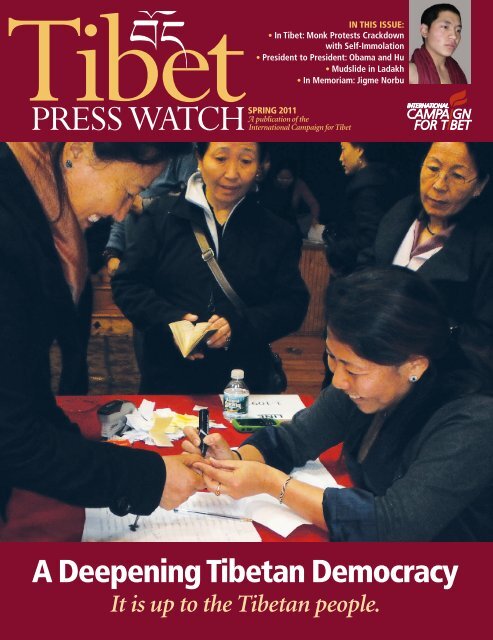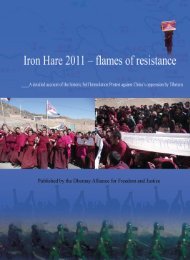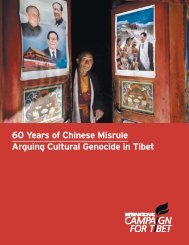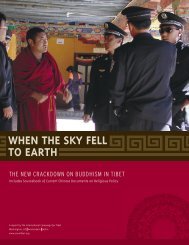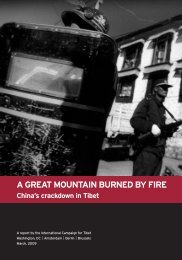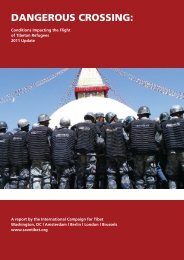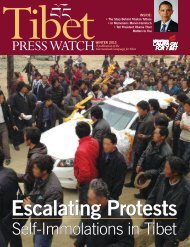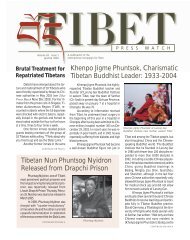Download the complete PDF - International Campaign for Tibet
Download the complete PDF - International Campaign for Tibet
Download the complete PDF - International Campaign for Tibet
You also want an ePaper? Increase the reach of your titles
YUMPU automatically turns print PDFs into web optimized ePapers that Google loves.
<strong>Tibet</strong> 2011<br />
PRESSWATCH SPRING<br />
IN THIS ISSUE:<br />
• In <strong>Tibet</strong>: Monk Protests Crackdown<br />
with Self-Immolation<br />
• President to President: Obama and Hu<br />
• Mudslide in Ladakh<br />
• In Memoriam: Jigme Norbu<br />
A publication of <strong>the</strong><br />
<strong>International</strong> <strong>Campaign</strong> <strong>for</strong> <strong>Tibet</strong><br />
A Deepening <strong>Tibet</strong>an Democracy<br />
It is up to <strong>the</strong> <strong>Tibet</strong>an people.
2<br />
MANDALA SOCIETY<br />
YOUR LIVING LEGACY TO TIBET<br />
The Mandala Society is an intimate group of <strong>Tibet</strong><br />
supporters, committed to helping future generations of<br />
<strong>Tibet</strong>ans. By including <strong>the</strong> <strong>International</strong> <strong>Campaign</strong> <strong>for</strong><br />
<strong>Tibet</strong> in <strong>the</strong>ir will or trust, Mandala Society members<br />
ensure that ICT will continue to have <strong>the</strong> resources to<br />
promote a peaceful resolution of <strong>the</strong> occupation of <strong>Tibet</strong>,<br />
and will be able to help rebuild <strong>Tibet</strong> when <strong>Tibet</strong>ans<br />
achieve genuine autonomy.<br />
For more in<strong>for</strong>mation about Mandala Society membership,<br />
please contact Chris Chaleunrath at 202-785-1515,<br />
ext. 225, chris.chaleunrath@savetibet.org, or use <strong>the</strong><br />
envelope attached to this newsletter to request a call.<br />
The Mandala Society of <strong>the</strong> <strong>International</strong> <strong>Campaign</strong> <strong>for</strong> <strong>Tibet</strong><br />
Cover photo: A <strong>Tibet</strong>an voter received a mark on her thumb signaling she has <strong>complete</strong>d <strong>the</strong> registration process in Queens, New York.
TIBET PRESSWATCH<br />
The <strong>International</strong> <strong>Campaign</strong> <strong>for</strong> <strong>Tibet</strong><br />
works to promote human rights<br />
and democratic freedoms <strong>for</strong><br />
<strong>the</strong> people of <strong>Tibet</strong>.<br />
Founded in 1988, ICT is a non-profit<br />
membership organization with offices<br />
in Washington, D.C., Amsterdam,<br />
Berlin and Brussels,<br />
and field offices in<br />
Dharamsala and Kathmandu.<br />
EXECUTIVE OFFICERS<br />
Richard Gere, Chairman<br />
Lodi Gyari, Executive Chair<br />
Mary Beth Markey, President<br />
Bhuchung Tsering,V.P. Special Programs<br />
BOARD OF DIRECTORS<br />
John Ackerly<br />
Ellen Bork<br />
Richard Gere<br />
Lodi Gyari<br />
Jim Kane<br />
Tony Karam<br />
Melissa Mathison<br />
Joel McCleary<br />
Keith Pitts<br />
Steve Schroeder<br />
Gare Smith<br />
Grace Spring<br />
CONTACT INFORMATION<br />
<strong>International</strong> <strong>Campaign</strong> <strong>for</strong> <strong>Tibet</strong><br />
1825 Jefferson Pl, NW<br />
Washington, DC 20036<br />
202-785-1515<br />
www.savetibet.org<br />
info@savetibet.org<br />
Newsletter Design:<br />
Wm. Whitehead Design<br />
Editorial Support:<br />
Pru Bovee and<br />
Mal Warwick Associates<br />
Cover photo: © Mary Beth Markey<br />
From <strong>the</strong> President<br />
“It is up to <strong>the</strong> <strong>Tibet</strong>an people.”<br />
Friends and supporters of <strong>the</strong> <strong>International</strong> <strong>Campaign</strong> <strong>for</strong> <strong>Tibet</strong><br />
know our mission is to promote human rights and democratic freedoms<br />
<strong>for</strong> <strong>the</strong> <strong>Tibet</strong>an people. As <strong>the</strong> Chinese government presses its<br />
aggressive assimilation policies in <strong>Tibet</strong>, <strong>the</strong> most keenly noted<br />
Mary Beth Markey,<br />
President<br />
among <strong>the</strong>se rights is <strong>the</strong> right of self-determination, widely understood as <strong>the</strong> right<br />
to participate in <strong>the</strong> democratic process of governance and to influence one’s future —<br />
politically, socially and culturally.<br />
When we explain to policymakers why <strong>Tibet</strong>ans in <strong>Tibet</strong> take great risks to assert <strong>the</strong>ir<br />
national identity or why His Holiness <strong>the</strong> Dalai Lama is leading <strong>Tibet</strong>ans in exile down<br />
a path of democratic governance, we are making a case <strong>for</strong> self-determination. And<br />
when <strong>the</strong> Chinese government clamps down on <strong>Tibet</strong>ans seeking to use <strong>the</strong>ir language<br />
in <strong>the</strong> classroom, remain on <strong>the</strong>ir lands, develop according to <strong>the</strong>ir priorities, or simply<br />
live by <strong>the</strong> ancient tenets of Buddhist teachings, we say,“it is not <strong>for</strong> <strong>the</strong> central planners<br />
in Beijing to determine, it is up to <strong>the</strong> <strong>Tibet</strong>an people!”<br />
This year, during his annual statement to <strong>the</strong> <strong>Tibet</strong>an people on March 10, <strong>Tibet</strong>an<br />
Uprising Day, <strong>the</strong> Dalai Lama made <strong>the</strong> historic announcement that he would devolve<br />
his political authority in <strong>the</strong> <strong>Tibet</strong>an government to a democratically elected leader.<br />
Since <strong>the</strong>n, <strong>the</strong> <strong>Tibet</strong>an community in exile and in <strong>Tibet</strong> has been roiling amid<br />
speculation about what this decision would mean <strong>for</strong> <strong>the</strong> future of <strong>Tibet</strong>. <strong>Tibet</strong>an<br />
intellectuals and leaders, inside and outside <strong>Tibet</strong>, have been engaged in close examination<br />
of <strong>the</strong> system that governs <strong>the</strong> functions of <strong>the</strong> exile government with an eye to<br />
a future that allows <strong>the</strong> Dalai Lama to step aside as leader.<br />
In this same historic moment, <strong>Tibet</strong>ans in exile voted on March 20 <strong>for</strong> <strong>the</strong>ir new political<br />
leadership. From Dharamsala to New York City and everywhere in between where<br />
<strong>Tibet</strong>ans live in freedom, <strong>Tibet</strong>ans went to <strong>the</strong> polls and with great seriousness cast<br />
<strong>the</strong>ir votes <strong>for</strong> Kalon Tripa, <strong>the</strong> leader of <strong>the</strong> Kashag or executive branch, and <strong>for</strong> <strong>the</strong>ir<br />
representatives in <strong>the</strong> <strong>Tibet</strong>an exile parliament. It was my great privilege to participate<br />
as a member of <strong>the</strong> <strong>Tibet</strong>an Election Observers Mission under <strong>the</strong> auspices of <strong>the</strong><br />
<strong>International</strong> Network of Parliamentarians <strong>for</strong> <strong>Tibet</strong> and funded in part by <strong>the</strong><br />
National Endowment <strong>for</strong> Democracy. I was greatly impressed by <strong>the</strong> professionalism<br />
and pride of those who campaigned, those who ran <strong>the</strong> election, and those who stood<br />
in long lines to vote.<br />
As we watch leaders around <strong>the</strong> world struggle to let loose <strong>the</strong> reigns of power, it is<br />
truly remarkable that His Holiness is ending a system founded by <strong>the</strong> Great Fifth Dalai<br />
Lama in 1642 by giving his people <strong>the</strong> gift of self-rule. The world is in motion and<br />
inevitably moving towards greater democracy. World leaders understand that <strong>the</strong>y need<br />
to pay regard to <strong>the</strong> freely expressed will of peoples. Our job at <strong>the</strong> <strong>International</strong><br />
<strong>Campaign</strong> <strong>for</strong> <strong>Tibet</strong>, with your help, is to stress that China is not immune to popular<br />
impulses <strong>for</strong> democratic freedoms. So far, Chinese authorities feel only threatened by<br />
calls <strong>for</strong> accountability and rule of law from those <strong>the</strong>y govern. But a path is opening up<br />
be<strong>for</strong>e <strong>the</strong>m.<br />
3
ICT Press Release<br />
Dalai Lama Proclaims Success of <strong>Tibet</strong>an<br />
Democracy, Hands over Government Duties<br />
to Elected <strong>Tibet</strong>an Leader Excerpt, March 9, 2011<br />
Amidst <strong>the</strong> <strong>Tibet</strong>an people’s annual commemoration of <strong>the</strong> 1959 <strong>Tibet</strong>an National Uprising<br />
against <strong>the</strong> Chinese Communist occupation of <strong>Tibet</strong>, His Holiness <strong>the</strong> Dalai Lama proclaimed<br />
a victory <strong>for</strong> <strong>Tibet</strong>an democracy by announcing his desire <strong>for</strong> <strong>the</strong> full devolution of his<br />
responsibilities in <strong>the</strong> <strong>Tibet</strong>an exile government to <strong>the</strong> elected <strong>Tibet</strong>an leader or Kalon Tripa.<br />
“In contrast to those long-serving autocrats who have been<br />
much in <strong>the</strong> news, <strong>the</strong> Dalai Lama is <strong>the</strong> rare visionary who is<br />
willingly divesting power to his people,” said Mary Beth Markey,<br />
ICT President.“His decision, based on <strong>the</strong> maturation of <strong>Tibet</strong>an<br />
democracy in exile, deserves both accolades and support.”<br />
In 1990, a Constitution Redrafting Committee instituted by<br />
<strong>the</strong> Dalai Lama prepared a draft Charter <strong>for</strong> <strong>Tibet</strong>ans in Exile.<br />
On July 14, 1991, following its circulation <strong>for</strong> popular comment,<br />
<strong>the</strong> <strong>Tibet</strong>an parliament in exile voted unanimously to<br />
approve <strong>the</strong> final Charter.<br />
The Charter is a working constitution modeled on similar documents<br />
in liberal democracies. To date, <strong>the</strong> only contentious<br />
provisions of <strong>the</strong> Charter have been those limiting <strong>the</strong> power<br />
of <strong>the</strong> Dalai Lama,<br />
“In contrast to those longserving<br />
autocrats who have<br />
been much in <strong>the</strong> news, <strong>the</strong><br />
Dalai Lama is <strong>the</strong> rare visionary<br />
who is willingly divesting<br />
power to his people…<br />
His decision, based on <strong>the</strong><br />
maturation of <strong>Tibet</strong>an<br />
democracy in exile, deserves<br />
both accolades and support.”<br />
4<br />
which he proposed.<br />
When <strong>the</strong> parliament<br />
pressed <strong>for</strong><br />
<strong>the</strong> withdrawal of<br />
<strong>the</strong>se provisions,<br />
<strong>the</strong> Dalai Lama responded:<br />
“The two<br />
clauses exist not as<br />
decorative pieces<br />
of <strong>the</strong> Charter but<br />
to drive home <strong>the</strong><br />
difference between<br />
a system that pays<br />
lip service to de-<br />
mocracy while holding on firmly to power, and one that is<br />
serious about implementing democracy.” The Dalai Lama<br />
summarily exercised his authority to limit his own power, overriding<br />
<strong>the</strong> parliament’s objection.<br />
“No one can dispute <strong>the</strong> relevance of <strong>the</strong> Dalai Lama as <strong>the</strong><br />
natural leader of <strong>the</strong> <strong>Tibet</strong>an people,” said Tsering Jampa,<br />
His Holiness <strong>the</strong> Dalai Lama reads from his March 10 statement<br />
in Dharamsala, India.<br />
Executive Director of ICT-Europe, “but now we will see how<br />
<strong>the</strong> <strong>Tibet</strong>an leaders in parliament respond to a significant step<br />
<strong>for</strong> <strong>the</strong> <strong>Tibet</strong>an people in <strong>the</strong> democratic process.”<br />
A spate of comments from Chinese officials dismissing <strong>the</strong><br />
authority of <strong>the</strong> Dalai Lama and directives limiting <strong>for</strong>eign<br />
travel in <strong>Tibet</strong> indicate that <strong>the</strong> Chinese government is nervous<br />
about what <strong>the</strong> Dalai Lama would say on March 10 and its<br />
effect on stability in <strong>Tibet</strong>. In March 2008, a wave of demonstrations<br />
began in Lhasa on <strong>Tibet</strong>an National Uprising Day and<br />
spread across <strong>the</strong> <strong>Tibet</strong>an plateau. The Chinese government<br />
responded with a massive security crackdown, and its tight<br />
restrictions remain in <strong>for</strong>ce.<br />
For a <strong>the</strong> <strong>complete</strong> statement, please visit<br />
www.dalailama.com.
In <strong>the</strong> News...<br />
As events in <strong>the</strong> Middle East drew international attention and support <strong>for</strong> ef<strong>for</strong>ts to secure<br />
democratic autonomy <strong>for</strong> countries long dominated by authoritarian regimes, <strong>the</strong> message<br />
of peaceful non-violence always espoused by His Holiness <strong>the</strong> Dalai Lama was more resonant<br />
than ever. The delicacy of <strong>Tibet</strong>’s challenges are shown in sharp relief in this quarter’s news<br />
media coverage.<br />
Dalai Lama to<br />
Retire from Political<br />
Life<br />
Jason Burke and Tania Branigan,<br />
guardian.co.uk.,<br />
Thursday March 10, 2011<br />
The Dalai Lama has announced he will<br />
retire from political life within days. In a<br />
speech posted on <strong>the</strong> internet and delivered<br />
in <strong>the</strong> nor<strong>the</strong>rn Indian hill town of<br />
Dharamsala, <strong>the</strong> <strong>Tibet</strong>an Buddhist spiritual<br />
leader said he would ask <strong>the</strong> <strong>Tibet</strong>an<br />
parliament in exile to make <strong>the</strong> necessary<br />
constitutional changes to relieve him<br />
of his “<strong>for</strong>mal authority” as head of <strong>the</strong><br />
<strong>Tibet</strong>an community outside China.<br />
The assembly, which meets early next<br />
week, is expected to approve his request.<br />
Kate Saunders, of <strong>the</strong> <strong>International</strong> <strong>Campaign</strong><br />
<strong>for</strong> <strong>Tibet</strong>, said <strong>the</strong> decision meant<br />
that “at a perilous moment in <strong>the</strong> history<br />
of <strong>Tibet</strong>” <strong>the</strong> Dalai Lama was “expressing<br />
his faith in <strong>the</strong> <strong>Tibet</strong>an people”.<br />
In Thursday’s speech <strong>the</strong> Dalai Lama<br />
spoke of recent events in <strong>the</strong> Middle<br />
East, describing <strong>the</strong>m as “remarkable<br />
non-violent struggles <strong>for</strong> freedom and<br />
democracy”.<br />
“I am a firm believer in non-violence and<br />
people power and <strong>the</strong>se events have<br />
shown once again that determined nonviolent<br />
action can indeed bring about<br />
positive change,” he said. “We must all<br />
hope that <strong>the</strong>se inspiring changes lead to<br />
genuine freedom, happiness and prosperity<br />
<strong>for</strong> <strong>the</strong> peoples in <strong>the</strong>se countries.”<br />
China’s <strong>for</strong>eign ministry spokeswoman,<br />
Jiang Yu, said <strong>the</strong> Dalai Lama was playing<br />
“tricks to deceive <strong>the</strong> international<br />
community”, <strong>the</strong> news agency Agence<br />
France Presse reported.<br />
<strong>Tibet</strong>an Monk<br />
Dies After<br />
Self-Immolation<br />
Edward Wong, New York Times,<br />
March 17, 2011<br />
BEIJING — A young <strong>Tibet</strong>an monk who<br />
set himself on fire to protest Chinese rule<br />
in <strong>the</strong> vast <strong>Tibet</strong>an regions of western<br />
China died early on Thursday. It was <strong>the</strong><br />
first time that a monk protesting against<br />
China had killed himself through selfimmolation,<br />
according to historians of<br />
modern <strong>Tibet</strong>.<br />
Phuntsog, a monk from Kirti Monastery<br />
in Sichuan Province who died after selfimmolation<br />
in <strong>Tibet</strong> in March.<br />
The act appeared to reflect <strong>the</strong> sense of<br />
desperation and futility that simmers<br />
among <strong>Tibet</strong>ans who chafe at rule by<br />
China, which invaded central <strong>Tibet</strong> in<br />
1951. The monk, Phuntsog, 21, belonged<br />
to <strong>the</strong> Kirti Monastery in Sichuan Province.<br />
The monastery has been a locus of<br />
protest against Chinese policies and was<br />
especially active in <strong>the</strong> 2008 <strong>Tibet</strong>an uprising,<br />
whose third anniversary is this<br />
month.<br />
A report by a <strong>Tibet</strong> advocacy organization<br />
based in Washington, <strong>International</strong><br />
<strong>Campaign</strong> <strong>for</strong> <strong>Tibet</strong>, said that security<br />
officers doused Phuntsog’s flames, <strong>the</strong>n<br />
proceeded to beat and kick him.<br />
Nepal Caught<br />
Between China and<br />
India<br />
Beijing pours money into <strong>the</strong><br />
Himalayan country, a historical<br />
buffer between <strong>the</strong> two giant rivals,<br />
worrying New Delhi.<br />
Mark Magnier, Los Angeles Times,<br />
February 20, 2011<br />
Reporting from Katmandu, Nepal — A<br />
recent recording making <strong>the</strong> rounds in<br />
Nepal featured a Maoist party leader<br />
speaking to a man with a Chinese accent.<br />
During <strong>the</strong> 12-minute tape, <strong>the</strong> Chinese<br />
voice offers $6.9 million to bribe 50<br />
Nepali legislators <strong>for</strong> help in <strong>for</strong>ming a<br />
Maoist-led government that would favor<br />
China over India.<br />
Whe<strong>the</strong>r <strong>the</strong> tape is genuine, whe<strong>the</strong>r <strong>the</strong><br />
voice is really that of a Chinese official<br />
5
In <strong>the</strong> News...<br />
and whe<strong>the</strong>r India’s intelligence wing released<br />
it as part of a propaganda exercise<br />
haven’t been established.<br />
But <strong>the</strong> tape rein<strong>for</strong>ced a long-standing<br />
view in Nepal: The strategically located,<br />
landlocked nation of 30 million people is<br />
a playground <strong>for</strong> its two giant neighbors.<br />
Beijing is building a $1.9-billion railroad<br />
from <strong>the</strong> city of Lhasa to <strong>the</strong> <strong>Tibet</strong>-Nepal<br />
border that may eventually reach Katmandu.<br />
Chinese trade, aid and infrastructure<br />
projects are pouring in. Nepali<br />
politicians traveling to Beijing are tripping<br />
over one ano<strong>the</strong>r as China funds<br />
Nepali police training, border control,<br />
roads, even garbage trucks.<br />
How I Met His<br />
Holiness <strong>the</strong> Dalai<br />
Lama Without a<br />
Passport<br />
by Woeser, first published on<br />
highpeakspureearth.com<br />
It all started with a video conversation in<br />
cyberspace. On January 4, 2011, His Holiness<br />
was in Dharamsala engaging in a<br />
video conversation with <strong>the</strong> two human<br />
rights lawyers, Teng Biao and Jiang Tianyong,<br />
as well as <strong>the</strong> author Wang Lixiong.<br />
6<br />
NEPAL<br />
INDIA<br />
CHINA<br />
And I was standing behind Wang Lixiong,<br />
attentively listening to every word.<br />
When <strong>the</strong> Dalai Lama appeared on screen,<br />
I could hardly believe it, tears started<br />
streaming down my face.<br />
Just like so many <strong>Tibet</strong>ans, hoping to be<br />
able to see His Holiness, to respectfully<br />
listen to his teachings, to be granted an<br />
audience, this has also been my innermost<br />
wish; from a very young age, I have<br />
always longed <strong>for</strong> this moment to come<br />
true. But, I cannot get a passport, just like<br />
many o<strong>the</strong>r <strong>Tibet</strong>ans, it is almost unthinkable<br />
that this regime that controls<br />
us will ever grant us a passport, which<br />
His Holiness has a video conversation<br />
with <strong>Tibet</strong>an blogger, Woeser.<br />
should, in actual fact, be a fundamental<br />
right that every citizen enjoys. Last year,<br />
Lhasa gave out passports to anyone above<br />
60 years of age, albeit only <strong>for</strong> <strong>the</strong> period<br />
of one week.<br />
As a result <strong>the</strong> office in charge of passports<br />
was full of <strong>the</strong> grey-haired, limping<br />
elderly; and it was clear that <strong>the</strong>y were all<br />
heading <strong>for</strong> <strong>the</strong> foothills of <strong>the</strong> Himalayas<br />
to visit relatives, pay homage to <strong>the</strong> holy<br />
land of Buddhism, as well as to fulfill that<br />
dream that no one speaks of but everyone<br />
knows. I am sorrowfully thinking<br />
that I may have to wait until I am 60<br />
years old until I get hold of a passport.<br />
However, <strong>the</strong> internet gave my passportless<br />
self a pass to travel; in <strong>the</strong> New Year,<br />
it helped me to make my dream come<br />
true — through <strong>the</strong> internet I met, as if<br />
in a dream but still very vivid and real,<br />
His Holiness <strong>the</strong> Dalai Lama!<br />
I cried and I cried. When I, as <strong>Tibet</strong>ans<br />
do, prostrated three times, silently reciting<br />
some prayers, holding a khata in my<br />
hands and kneeling in front of <strong>the</strong> computer<br />
with tear-dimmed eyes, I saw His<br />
Holiness reaching out both of his hands<br />
as if he was going to take <strong>the</strong> khata, as if<br />
he was going to give me his blessings.<br />
I am unable to describe with words how<br />
Woeser virtually offers a khata to His<br />
Holiness <strong>the</strong> Dalai Lama via an internet<br />
call in January.<br />
I felt… I am really such a <strong>for</strong>tunate<br />
person; in <strong>Tibet</strong>, many people get into<br />
trouble simply <strong>for</strong> owning a photo of <strong>the</strong><br />
Dalai Lama.<br />
Facing <strong>the</strong> image of me on <strong>the</strong> screen, <strong>the</strong><br />
Dalai Lama instructed me in an earnest<br />
and tireless way: “Do not give up, keep<br />
going, it is of <strong>the</strong> utmost importance that<br />
Han Chinese intellectuals and we <strong>Tibet</strong>ans<br />
always tell each o<strong>the</strong>r about <strong>the</strong> real situation,<br />
that we communicate with and<br />
understand each o<strong>the</strong>r; you have to internalise<br />
this. Over <strong>the</strong> past 60 years, <strong>the</strong><br />
courage and faith of those of us <strong>Tibet</strong>ans<br />
living in <strong>Tibet</strong> has been as strong as a rock.
The international community is paying<br />
close attention to <strong>the</strong> real situation in<br />
<strong>Tibet</strong>, people from all over <strong>the</strong> world see<br />
that <strong>the</strong>re is a truth in <strong>Tibet</strong>, Chinese intellectuals<br />
are increasingly aware of this,<br />
looking at it from a broad perspective,<br />
big and powerful China is in <strong>the</strong> process<br />
of trans<strong>for</strong>ming. Hence, you must<br />
remain confident and work even harder,<br />
do you understand?”<br />
By <strong>the</strong>n, I had already calmed down and<br />
kept <strong>the</strong> words spoken by His Holiness<br />
in my heart.<br />
Tour Agents:<br />
<strong>Tibet</strong> Closed to<br />
Foreigners in March<br />
CNBC website, March 7, 2011<br />
BEIJING — Chinese travel agents organizing<br />
trips to <strong>Tibet</strong> said Monday <strong>the</strong>y<br />
have been ordered not to receive <strong>for</strong>eign<br />
visitors around <strong>the</strong> March 14 anniversary<br />
of a bloody anti-government riot in<br />
2008.<br />
The top Chinese government official <strong>for</strong><br />
<strong>Tibet</strong> confirmed <strong>the</strong>re were restrictions<br />
but said <strong>the</strong>y were being en<strong>for</strong>ced <strong>for</strong><br />
safety reasons, citing possible overcrowding<br />
and <strong>the</strong> bitterly cold winter<br />
wea<strong>the</strong>r.<br />
Zhang Qingli, <strong>the</strong> Communist Party head<br />
<strong>for</strong> <strong>the</strong> <strong>Tibet</strong>an region, told reporters at a<br />
briefing on <strong>the</strong> sidelines of <strong>the</strong> annual<br />
legislative session in Beijing that <strong>the</strong><br />
regional government “had taken some<br />
control measures this year” to limit <strong>the</strong><br />
number of visitors allowed into <strong>Tibet</strong>.<br />
“It’s not that <strong>the</strong> anti-Chinese <strong>for</strong>ces and<br />
<strong>the</strong> Dalai clique haven’t thought of it, but<br />
<strong>the</strong> fact is <strong>the</strong>y haven’t been able to stir<br />
up any unrest since <strong>the</strong> March 14 (2008)<br />
incident,” Zhang said.<br />
His Holiness <strong>the</strong> 17th Gyalwa<br />
Karmapa Ogyen Trinley Dorje.<br />
Karmapa is No<br />
Chinese Spy, He is<br />
an Asset <strong>for</strong> India<br />
Kate Saunders, sunday-guardian.com,<br />
March 8, 2011<br />
As <strong>the</strong> world’s attention was focused<br />
on Tahrir Square and Tripoli, <strong>Tibet</strong>ans<br />
quietly celebrated <strong>the</strong> news that one of<br />
<strong>the</strong>ir most important religious leaders,<br />
<strong>the</strong> Karmapa, had been cleared following<br />
weeks of feverish speculation in India<br />
sparked by an investigation into donations<br />
received by his monastery in Himachal<br />
Pradesh.<br />
On 16 February Home Secretary G.K.<br />
Pillai assured a Buddhist delegation that<br />
<strong>the</strong> Central government did not regard<br />
<strong>the</strong> Karmapa to be a Chinese spy, despite<br />
a virtual media witch-hunt over <strong>the</strong> past<br />
few weeks.<br />
The Karmapa, a powerful <strong>for</strong>ce <strong>for</strong> reconciliation<br />
across diverse cultures, is particularly<br />
passionate about protecting <strong>the</strong><br />
environment, and has set up a network<br />
of Buddhist monasteries and centres in<br />
<strong>the</strong> Himalayas, called Khoryug, with <strong>the</strong><br />
aim of “practically applying values of<br />
compassion and inter-dependence”.<br />
Since <strong>the</strong> police investigation, <strong>the</strong>re has<br />
been an outpouring of support <strong>for</strong> <strong>the</strong><br />
Karmapa from people across India. The<br />
reality is that many Indians have realised<br />
that, just like his predecessor into exile<br />
<strong>the</strong> Dalai Lama, <strong>the</strong> Karmapa is an asset<br />
<strong>for</strong> India and not a security threat, even<br />
while this support has rarely been reported<br />
in <strong>the</strong> Indian media. Instead, distorted,<br />
un-sourced reports with no basis<br />
in reality about <strong>the</strong> Karmapa as “Chinese<br />
spy”made banner headlines and have been<br />
replayed again and again on TV news.<br />
Senate Mission<br />
Urges US-China<br />
Cooperation<br />
on <strong>Tibet</strong><br />
Mat<strong>the</strong>w Pennington,AP, March 30, 2011<br />
A rare Senate staff mission to <strong>Tibet</strong> has<br />
recommended <strong>the</strong> U.S. work with China<br />
<strong>for</strong> <strong>the</strong> economic development and cultural<br />
preservation of <strong>the</strong> region. But <strong>the</strong><br />
delegation also said Washington should<br />
keep urging Beijing to reconcile with<br />
Buddhist leader, <strong>the</strong> Dalai Lama, and<br />
o<strong>the</strong>r exiled <strong>Tibet</strong>ans.<br />
“There are steps that <strong>the</strong> United States<br />
can take that might not only bring direct<br />
benefits to <strong>the</strong> <strong>Tibet</strong>an people, but also<br />
begin to build a foundation of trust<br />
between Washington and Beijing on<br />
<strong>Tibet</strong>an affairs,” <strong>the</strong> report by <strong>the</strong> Senate<br />
Foreign Relations Committee says.<br />
The U.S. currently funds some American<br />
nongovernmental aid groups working in<br />
<strong>Tibet</strong>an regions, allotting $8 million <strong>for</strong><br />
<strong>the</strong> purpose in 2009.<br />
The Dalai Lama recently announced he<br />
would resign from politics and make way<br />
<strong>for</strong> an elected leader, suggesting it could<br />
make easier negotiations between <strong>Tibet</strong>an<br />
exiles and Beijing that have made little<br />
headway.<br />
The four-member delegation of staff<br />
from <strong>the</strong> Senate committee traveled to<br />
<strong>Tibet</strong> last September. The report says <strong>the</strong><br />
delegation was “impressed by <strong>the</strong> scale<br />
and scope of <strong>the</strong> economic trans<strong>for</strong>mation”<br />
that has lifted hundreds of thousands<br />
out of poverty, driven by massive<br />
state investment in infrastructure. But it<br />
said <strong>the</strong> boom has heralded a massive influx<br />
of China’s ethnic Han majority so in<br />
Lhasa ethnic <strong>Tibet</strong>ans are now a minority.<br />
It says discrimination persists and<br />
Buddhist monasteries face strict controls,<br />
breeding resentment among <strong>Tibet</strong>ans.<br />
7
<strong>Tibet</strong>an Democracy<br />
by Leslie Butterfield<br />
On March 10, 2011 His Holiness <strong>the</strong> Dalai Lama officially announced his intention<br />
to devolve <strong>the</strong> remainder of his political authority within <strong>the</strong> Central <strong>Tibet</strong>an<br />
Administration (CTA) to an elected official within <strong>the</strong> <strong>Tibet</strong>an Government in Exile.<br />
This announcement marked a culmination<br />
of <strong>the</strong> development of democracy in<br />
exile and serves as an example to <strong>the</strong><br />
world of <strong>the</strong> <strong>Tibet</strong>an exile community’s<br />
steadfast commitment to good governance.<br />
Less than two weeks later on<br />
March 20, 2011 <strong>the</strong> <strong>Tibet</strong>an population<br />
in exile took ano<strong>the</strong>r stride toward<br />
democracy, voting <strong>for</strong> <strong>the</strong> next leader of<br />
<strong>the</strong>ir Cabinet, <strong>the</strong> Kalon Tripa. The peaceful<br />
transfer of power to <strong>the</strong> next Kalon<br />
Tripa this summer, who will officially<br />
take on <strong>the</strong> Dalai Lama’s political leadership<br />
of <strong>the</strong> exile government, represents a<br />
popular embrace of democratic institutions<br />
and <strong>the</strong> fruition of <strong>the</strong> Dalai Lama’s<br />
dreams <strong>for</strong> democratization.<br />
Levels of voter registration<br />
exceed past elections and <strong>the</strong><br />
excitement generated in this<br />
year’s vote has indicated<br />
that <strong>Tibet</strong>ans in exile have<br />
indeed begun to take on <strong>the</strong><br />
responsibility requisite <strong>for</strong><br />
a democracy to flourish.<br />
For nearly six decades <strong>the</strong> Dalai Lama has<br />
been carefully adjusting his democratizing<br />
ef<strong>for</strong>ts to correspond to <strong>the</strong> readiness<br />
of <strong>the</strong> <strong>Tibet</strong>an population to accept <strong>the</strong>m.<br />
Even be<strong>for</strong>e fleeing into exile in 1959, <strong>the</strong><br />
Dalai Lama was working to limit his<br />
powers within <strong>the</strong> government in <strong>the</strong><br />
interest of empowering <strong>the</strong> <strong>Tibet</strong>an people.<br />
However, as <strong>the</strong> Chinese Communist<br />
Party took control and <strong>the</strong> Dalai Lama<br />
fled over <strong>the</strong> Himalayas to India his<br />
re<strong>for</strong>ms had little time to take hold.<br />
After fleeing into exile <strong>the</strong> Dalai Lama<br />
began institutionalizing <strong>the</strong> democratic<br />
vision he had <strong>for</strong> his countrymen. In April<br />
8<br />
1959 <strong>the</strong> Dalai Lama established <strong>the</strong> Central<br />
<strong>Tibet</strong>an Administration of His Holiness<br />
<strong>the</strong> Dalai Lama (CTA), which took<br />
on <strong>the</strong> responsibility of providing basic<br />
social services <strong>for</strong> <strong>the</strong> refugee community.<br />
Thus, despite not having an actual<br />
country over which to govern, <strong>the</strong> <strong>Tibet</strong>an<br />
government in exile had <strong>the</strong> basis<br />
<strong>for</strong> democracy.<br />
In his statement on March 10, 1961 <strong>the</strong><br />
Dalai Lama called <strong>for</strong> fur<strong>the</strong>r re<strong>for</strong>ms to<br />
<strong>the</strong> provisional government and worked<br />
with its leaders to create a new constitution<br />
guiding <strong>Tibet</strong>ans on <strong>the</strong> trajectory<br />
towards democratic governance. However,<br />
<strong>for</strong> <strong>Tibet</strong>ans in exile this document<br />
was considered a draft, awaiting final<br />
approval upon returning to <strong>Tibet</strong>. Because<br />
of <strong>the</strong> draft nature of <strong>the</strong> constitution,<br />
<strong>the</strong>re were few detailed provisions <strong>for</strong> <strong>the</strong><br />
specifics of running <strong>the</strong> government in<br />
exile and <strong>the</strong> institution developed somewhat<br />
organically out of necessity in <strong>the</strong><br />
A <strong>Tibet</strong>an shows his Green Book and prepares to vote on March 20.<br />
thirty years following <strong>the</strong> adoption of <strong>the</strong><br />
new Draft Constitution in 1963.<br />
Initially <strong>for</strong> many <strong>Tibet</strong>ans <strong>the</strong> establishment<br />
of democracy in <strong>the</strong> 1960s was less<br />
about <strong>the</strong>ir freedoms and more centered<br />
on following <strong>the</strong> wishes of His Holiness,<br />
<strong>the</strong>ir great protector. Not only was <strong>the</strong><br />
idea of self-proclaimed candidacy, inherent<br />
in <strong>the</strong> democratic process, considered<br />
a shameless self-promotion that was<br />
uncharacteristic among <strong>the</strong> <strong>Tibet</strong>an population,<br />
but many <strong>Tibet</strong>ans approached<br />
elections with little knowledge of <strong>the</strong><br />
candidates, instead praying to <strong>the</strong> Dalai<br />
Lama <strong>for</strong> guidance upon entering <strong>the</strong>ir<br />
polling stations. Thus from <strong>the</strong> outset<br />
democracy in exile faced challenges stemming<br />
from cultural mores which celebrated<br />
previous <strong>the</strong>ocratic tendencies.<br />
In spite of <strong>the</strong>se initial leanings, <strong>the</strong><br />
<strong>Tibet</strong>an population in exile soon began<br />
to embrace democracy. Gradually, <strong>the</strong>
On March 2, 2011, ICT’s Board of Directors met with <strong>the</strong> three candidates <strong>for</strong> Kalon Tripa:<br />
Lobsang Sangay, Tenzin N. Tethong, and Tashi Wangdi.<br />
parliament which had been set up in 1960<br />
enacted re<strong>for</strong>ms including <strong>the</strong> establishment<br />
of a separate election commission.<br />
A Constitution Redrafting Committee<br />
convened by <strong>the</strong> Dalai Lama in 1990<br />
began work on fur<strong>the</strong>r re<strong>for</strong>ms to better<br />
meet <strong>the</strong> needs of governing in exile. Following<br />
circulation among <strong>the</strong> exile community<br />
<strong>for</strong> popular comment, on June 14,<br />
1991 <strong>the</strong> draft Charter <strong>for</strong> <strong>Tibet</strong>ans in<br />
Exile was unanimously approved by <strong>the</strong><br />
<strong>Tibet</strong>an parliament. Two weeks later, <strong>the</strong><br />
Dalai Lama added his consent, making<br />
<strong>the</strong> document duly approved by <strong>the</strong> elected<br />
representatives of <strong>the</strong> <strong>Tibet</strong>ans in exile<br />
and by <strong>the</strong>ir spiritual and political leader.<br />
Among <strong>the</strong> provisions included in <strong>the</strong><br />
new Charter were some intended to limit<br />
<strong>the</strong> Dalai Lama’s political power. He had<br />
proposed similar measures in <strong>the</strong> 1963<br />
Constitution which would have allowed<br />
<strong>for</strong> his impeachment by a majority of<br />
parliamentarians, but this proposal had<br />
been met with widespread resistance and<br />
threatened to prevent <strong>the</strong> approval of <strong>the</strong><br />
Constitution. <strong>Tibet</strong>ans believe that <strong>the</strong><br />
Dalai Lama is <strong>the</strong> reincarnation of Avalokiteshvara,<br />
<strong>the</strong> bodhisattva of compassion<br />
and <strong>the</strong> protector of <strong>Tibet</strong> and<br />
<strong>Tibet</strong>ans — <strong>the</strong> thought of impeaching<br />
him was <strong>for</strong> many <strong>Tibet</strong>ans ana<strong>the</strong>ma to<br />
<strong>the</strong>ir belief system.<br />
Democracy or not, such a proposition<br />
seemed like an ill-considered drastic<br />
measure. However, <strong>the</strong> Dalai Lama held<br />
<strong>the</strong> view that, “if we were to have a true<br />
democracy <strong>the</strong>re had to be provisions<br />
whereby <strong>the</strong> Dalai Lama’s powers could<br />
also be changed… I had to convince<br />
<strong>the</strong>m that it was absolutely necessary not<br />
just <strong>for</strong> <strong>the</strong> present but <strong>for</strong> <strong>the</strong> future of<br />
all <strong>the</strong> <strong>Tibet</strong>an people.”<br />
By <strong>the</strong> 1990s most <strong>Tibet</strong>ans were still<br />
opposed to <strong>the</strong>se propositions. However,<br />
in an exercise of his executive authority,<br />
<strong>the</strong> Dalai Lama overrode <strong>the</strong> parliamentarians’<br />
objections explaining that such a<br />
provision must be included in <strong>the</strong> Charter<br />
<strong>for</strong> it to be of any value. Reluctantly<br />
<strong>the</strong> <strong>Tibet</strong>an population in exile accepted<br />
<strong>the</strong>se terms and <strong>the</strong> Charter was brought<br />
into <strong>for</strong>ce by popular vote in 1991.<br />
The Charter also brought about changes<br />
in <strong>the</strong> structure and powers of <strong>the</strong> legislative<br />
assembly, <strong>the</strong>n called <strong>the</strong> Assembly<br />
of <strong>Tibet</strong>an People’s Deputies now<br />
known as <strong>the</strong> <strong>Tibet</strong>an Parliament in Exile<br />
(TPIE). The body was restructured to include<br />
individuals representing <strong>the</strong> three<br />
main regions in <strong>Tibet</strong> (U-Tsang, Kham,<br />
and Amdo), two exile communities<br />
(North America and Europe), each of <strong>the</strong><br />
four religious sects (Gelug, Kagyu, Sakya,<br />
and Nyingma) as well as <strong>the</strong> Bon religious<br />
tradition, and three individuals<br />
appointed directly by <strong>the</strong> Dalai Lama.<br />
<strong>Tibet</strong>ans from inside <strong>Tibet</strong> do not vote,<br />
however, relatives with ties to any of <strong>the</strong><br />
regions vote <strong>for</strong> <strong>the</strong> members representing<br />
those constituencies. For example, a<br />
<strong>Tibet</strong>an from Amdo living in Dharamsala<br />
could vote <strong>for</strong> <strong>the</strong> Amdo representative<br />
but not <strong>the</strong> one from U-Tsang. These<br />
constituencies elected a total of 46 representatives<br />
who <strong>for</strong> <strong>the</strong> first time held<br />
<strong>the</strong> power to vote <strong>for</strong> <strong>the</strong> Cabinet (Kashag)<br />
which until that time had been<br />
directly appointed by <strong>the</strong> Dalai Lama.<br />
It was not until an amendment to <strong>the</strong><br />
Charter in 2001 on <strong>the</strong> advice of <strong>the</strong><br />
Dalai Lama that <strong>the</strong> <strong>Tibet</strong>an population<br />
in exile could vote <strong>for</strong> <strong>the</strong> Chairman of<br />
<strong>the</strong> Kashag, <strong>the</strong> Kalon Tripa. The popularly<br />
elected Kalon Tripa is eligible to<br />
Professor Samdhong Rinpoche has served<br />
since 2001 as <strong>the</strong> first democratically<br />
elected Kalon Tripa.<br />
serve up to two five-year terms. Professor<br />
Samdhong Rinpoche was <strong>the</strong> first<br />
Kalon Tripa to be popularly elected in<br />
2001 and has served two consecutive<br />
terms. The past months have seen <strong>the</strong><br />
first truly contested election <strong>for</strong> Kalon<br />
Tripa, with three leading candidates engaging<br />
in continued public debate<br />
around <strong>the</strong> world. Dr. Lobsang Sangay,<br />
Kasur Tenzin Tethong and Kasur Tashi<br />
Wangdi have been on <strong>the</strong> campaign trail<br />
throughout exile communities in Europe,<br />
North America and Asia. Levels of voter<br />
registration exceed past elections and <strong>the</strong><br />
excitement generated in this year’s vote<br />
has indicated that <strong>Tibet</strong>ans in exile have<br />
indeed begun to take on <strong>the</strong> responsibility<br />
requisite <strong>for</strong> a democracy to flourish.<br />
As <strong>the</strong> Dalai Lama prepares to officially<br />
hand over his political role in <strong>the</strong> exile<br />
government to an elected leadership it<br />
would seem that <strong>the</strong> exile community is<br />
well equipped to carry on his democratic<br />
ideal.<br />
9
<strong>Tibet</strong> Lobby Day<br />
Political activism by <strong>Tibet</strong>an-Americans and <strong>the</strong>ir supporters<br />
On February 28 and March 1, 2011, <strong>Tibet</strong>an-Americans and friends of <strong>Tibet</strong> from around <strong>the</strong><br />
United States visited Capitol Hill to meet with <strong>the</strong>ir congressional representatives.They asked<br />
Congress to sustain programmatic investments and political support to help <strong>Tibet</strong>ans preserve<br />
<strong>the</strong>ir identity. They also urged support <strong>for</strong> <strong>the</strong> basic desire of all peoples, including <strong>Tibet</strong>ans,<br />
<strong>for</strong> universal freedoms.<br />
“This <strong>Tibet</strong> Lobby Day demonstrates <strong>the</strong><br />
growing political maturity of <strong>the</strong> <strong>Tibet</strong>an-<br />
American community and <strong>the</strong>ir desire <strong>for</strong> a<br />
larger political voice in Washington,” said<br />
Todd Stein, ICT Director of Government<br />
Relations. “They will find open doors, given<br />
Congress’ long-standing support <strong>for</strong> <strong>Tibet</strong>.”<br />
More than 110 participants from Florida to<br />
Washington, Cali<strong>for</strong>nia to Maine, and many<br />
states in between participated in more than<br />
100 meetings in <strong>the</strong> House of Representatives<br />
and Senate.<br />
<strong>Tibet</strong> Lobby Day 2011 captured <strong>the</strong> momentum <strong>for</strong> <strong>Tibet</strong><br />
established at <strong>the</strong> January US-China Summit in Washington,<br />
D.C. during which President Obama publicly called <strong>for</strong> a<br />
resumption of <strong>the</strong> dialogue between Chinese officials and <strong>the</strong><br />
Dalai Lama’s representatives. Lobby Day was just three weeks<br />
be<strong>for</strong>e <strong>the</strong> March 20 election in <strong>the</strong> <strong>Tibet</strong>an exile community<br />
<strong>for</strong> parliamentary representatives and <strong>for</strong> <strong>the</strong> chief executive<br />
(or Kalon Tripa) of <strong>the</strong> Central <strong>Tibet</strong>an Administration based<br />
in Dharamsala, India.<br />
ICT Executive Chair, Lodi Gyari and ICT Board Chair, Richard Gere<br />
met with House Democratic Leader Nancy Pelosi <strong>for</strong> <strong>Tibet</strong> Lobby<br />
Day 2011.<br />
10<br />
A <strong>Tibet</strong> Lobby Day participant with<br />
Senator Mark Udall of Colorado.<br />
These two manifestations of participatory<br />
democracy by <strong>Tibet</strong>an Americans — voting<br />
<strong>for</strong> <strong>the</strong>ir exile government leadership and<br />
lobbying <strong>the</strong> Congress of <strong>the</strong>ir adopted country<br />
— echo <strong>the</strong> <strong>Tibet</strong>an people’s demands <strong>for</strong><br />
basic human rights (including freedom of<br />
expression and assembly) within <strong>Tibet</strong> itself.<br />
The success of <strong>the</strong> <strong>Tibet</strong>an exile community’s<br />
democratic aspirations, supported and<br />
encouraged by His Holiness <strong>the</strong> Dalai Lama,<br />
are in stark contrast to <strong>the</strong> plight of <strong>Tibet</strong>ans<br />
inside <strong>Tibet</strong>.<br />
Commenting on <strong>Tibet</strong> Lobby Day, ICT’s Tencho Gyatso said:<br />
“Voicing our support <strong>for</strong> <strong>Tibet</strong> in <strong>the</strong> halls of Congress demonstrates<br />
our commitment to democracy. We look around <strong>the</strong><br />
world today, and we feel <strong>the</strong> same yearnings <strong>for</strong> freedoms that<br />
our bro<strong>the</strong>rs and sisters in <strong>the</strong> Middle East feel. That we can<br />
organize and speak up with dignity and without fear of reprisals<br />
makes very clear <strong>the</strong> differences between being a <strong>Tibet</strong>an in<br />
America and being a <strong>Tibet</strong>an in <strong>the</strong> PRC (People’s Republic of<br />
China). We hope <strong>for</strong> a time when all <strong>Tibet</strong>ans experience openness<br />
and accountability from <strong>the</strong>ir government.”<br />
Lobby Day participants ga<strong>the</strong>red with Maine Congresswoman<br />
Chellie Pingree’s Foreign Affairs staffer Nora Bisharat after <strong>the</strong>ir<br />
meeting.
President Obama Meets with President Hu;<br />
Presses Him on Human Rights<br />
When President Hu of <strong>the</strong> People’s Republic<br />
of China traveled to <strong>the</strong> United States <strong>for</strong> a<br />
four-day state visit in late January, he found<br />
that President Obama was increasing <strong>the</strong><br />
pressure on China’s human rights record.<br />
Unlike <strong>the</strong> previous state visit (by Obama to China in 2009),<br />
human rights was no longer considered to be an off-<strong>the</strong>-table<br />
topic, and Obama told Hu to provide more freedom to China’s<br />
1.3 billion people — his most <strong>for</strong>ceful message on this contentious<br />
issue to date.<br />
Hu’s response included an acknowledgment that his government<br />
needed to do more in support of human rights — but<br />
he was very clear about Chinese sovereignty, noting that any<br />
fur<strong>the</strong>r discussion on human rights must not attempt to<br />
interfere with China’s affairs.<br />
Presidents Hu and Obama at <strong>the</strong> White House news conference.<br />
President Obama stated “As I’ve said be<strong>for</strong>e and I repeated to<br />
President Hu, we have some core views as Americans about <strong>the</strong><br />
universality of certain rights — freedom of speech, freedom<br />
of religion, freedom of assembly — that we think are very<br />
important and that transcend cultures. I have been very candid<br />
with President Hu about <strong>the</strong>se issues.<br />
After blaming translators and technical problems at <strong>the</strong>ir press<br />
conference toge<strong>the</strong>r, President Hu did eventually respond to<br />
questions (in itself a diplomatic coup <strong>for</strong> <strong>the</strong> White House).<br />
“China is always committed to <strong>the</strong> protection and promotion<br />
of human rights,” he said.<br />
He conceded that “a lot still needs to be done,” and said his government<br />
would be willing to continue a discussion on human<br />
rights — provided that<br />
dialogue proceeded<br />
on <strong>the</strong> basis of mutual<br />
respect and noninterference<br />
into China’s<br />
internal issues.<br />
President Obama surprised<br />
many <strong>Tibet</strong> observers<br />
by specifically<br />
calling <strong>for</strong> a resumption<br />
of <strong>the</strong> dialogue<br />
process, “Even as we,<br />
<strong>the</strong> United States, rec-<br />
“As I’ve said be<strong>for</strong>e and<br />
I repeated to President Hu,<br />
we have some core views<br />
as Americans about <strong>the</strong><br />
universality of certain rights<br />
— freedom of speech,<br />
freedom of religion, freedom<br />
of assembly — that we think<br />
are very important and that<br />
transcend cultures.”<br />
ognize that <strong>Tibet</strong> is part of <strong>the</strong> People’s Republic of China, <strong>the</strong><br />
United States continues to support fur<strong>the</strong>r dialogue between <strong>the</strong><br />
government of China and <strong>the</strong> representatives of <strong>the</strong> Dalai Lama<br />
to resolve concerns and differences, including <strong>the</strong> preservation<br />
of <strong>the</strong> religious and cultural identity of <strong>the</strong> <strong>Tibet</strong>an people.”<br />
Drawing on a key phrase of Hu’s government — “Harmonious<br />
society,” — President Obama welcomed President Hu to Washington<br />
by saying in part “History shows that societies are more<br />
harmonious, nations are more successful and <strong>the</strong> world is more<br />
just when <strong>the</strong> rights and responsibilities of all nations and all<br />
people are upheld, including <strong>the</strong> universal rights of every<br />
human being.”<br />
ICT President Mary Beth Markey praised Obama’s remarks<br />
saying “I think it was a good day <strong>for</strong> human rights. He said<br />
exactly what we wanted him to say on <strong>Tibet</strong>.”<br />
President Obama surprised many <strong>Tibet</strong> observers by specifically<br />
calling <strong>for</strong> a resumption of <strong>the</strong> dialogue process.<br />
11
Aftermath of <strong>the</strong> Ladakh Mudslide<br />
Showing our support<br />
On <strong>the</strong> night of August 6, 2010, a violent storm unleashed torrents of rain on <strong>the</strong> remote<br />
Indian Himalayan region of Ladakh. The region, parched, was unable to absorb <strong>the</strong> rapid<br />
influx of rain and <strong>the</strong> floods poured down mountainsides and into valleys. The ancient<br />
capital of Leh, home to thousands of <strong>Tibet</strong>an refugees in twelve settlements, was right in<br />
<strong>the</strong> path of a water and mud surge.<br />
A <strong>Tibet</strong>an woman surveys <strong>the</strong> damage to her crops caused by <strong>the</strong><br />
violent mudslide.<br />
At least 190 died in <strong>the</strong> mudslide; hundreds of homes and businesses<br />
were leveled. As morning broke, Ladakhi and <strong>Tibet</strong>an<br />
rescue workers struggled side by side to free <strong>the</strong> dead and <strong>the</strong><br />
injured from <strong>the</strong> mud-choked debris.<br />
While just three <strong>Tibet</strong>ans were killed, <strong>the</strong> impact to <strong>the</strong>ir communities<br />
was devastating. The floods destroyed scores of homes<br />
in <strong>the</strong> hastily-constructed refugee centers on <strong>the</strong> outskirts of<br />
town. Barley, <strong>the</strong> staple food crop, has traditionally been grown<br />
in small family fields adjacent to homes; <strong>the</strong> floods, however,<br />
carpeted <strong>the</strong>se plots with boulders and a thick layer of heavily<br />
compacted mud, ruining <strong>the</strong> season’s crop. With a frigid<br />
Himalayan winter only a few months distant, <strong>the</strong> situation<br />
was grim.<br />
<strong>Tibet</strong>ans left homeless were given temporary shelter in <strong>the</strong> community<br />
room of <strong>the</strong> 2,000 student <strong>Tibet</strong>an Children’s Village,<br />
which escaped <strong>the</strong> floods unsca<strong>the</strong>d. Lacking heavy machinery,<br />
<strong>the</strong> <strong>Tibet</strong>an community began <strong>the</strong> back-breaking process of<br />
clearing away <strong>the</strong> mud and debris with whatever rudimentary<br />
tools <strong>the</strong>y could find.<br />
The <strong>Tibet</strong>an Central Administration stepped <strong>for</strong>ward to coordinate<br />
<strong>the</strong> rebuilding, led by Dhondup Tashi, <strong>the</strong> Chief<br />
Representative Officer (CRO) of His Holiness <strong>the</strong> Dalai Lama<br />
12<br />
<strong>Tibet</strong>ans and Ladakhi work to dig <strong>the</strong>ir homes and business out of<br />
<strong>the</strong> compacted mud.<br />
in Choglamsar, Leh-Ladakh India, and Tsering Palden, director<br />
of <strong>the</strong> <strong>Tibet</strong>an Children’s Village. Shortly after <strong>the</strong> disaster,<br />
His Holiness <strong>the</strong> Dalai Lama contributed 1 million rupees<br />
(approximately $22,000) to <strong>the</strong> recovery ef<strong>for</strong>ts; <strong>the</strong> US<br />
government pledged its financial support.<br />
To guide <strong>the</strong> rebuilding, each of <strong>the</strong> twelve <strong>Tibet</strong>an settlements<br />
sent a representative to a central council, coordinated by<br />
Dhondup Tashi, to decide how to allocate rebuilding funds<br />
based on <strong>the</strong> degree of damage to homes and fields. Reconstruction<br />
ef<strong>for</strong>ts continue many months after <strong>the</strong> cloudburst,<br />
with much work left to clear <strong>the</strong> barley fields so many <strong>Tibet</strong>an<br />
families depend.<br />
Funds are urgently needed to assist <strong>the</strong> <strong>Tibet</strong>an people in Leh.<br />
Following a visit by two Washington, DC based ICT representatives,<br />
both ICT and ICT Europe have allocated $5,000 to help<br />
in hiring <strong>Tibet</strong>an workers <strong>for</strong> ongoing recovery work through<br />
ICT’s Private Partnership <strong>for</strong> <strong>the</strong> Sustainability of <strong>Tibet</strong>an<br />
Communities.<br />
If you would like to support <strong>the</strong>se ef<strong>for</strong>ts, please make your<br />
check payable to ICT with “Sustainability Fund” in <strong>the</strong> memo<br />
line and send it to ICT, 1825 Jefferson Place NW, Washington,<br />
DC 20036.
In response to reader request, we have added a feature<br />
which will highlight one aspect of <strong>Tibet</strong>an culture in<br />
each edition of <strong>Tibet</strong> Press Watch.<br />
Avalokitesvara and <strong>the</strong> <strong>Tibet</strong>an<br />
Contemplation of Compassion<br />
Who is Avalokitesvara? Why is he important to <strong>Tibet</strong>ans?<br />
Avalokitesvara (pronounced Ah-va lo<br />
k’tesh vara) is <strong>the</strong> personification of<br />
compassion, and one of <strong>the</strong> most important<br />
Buddhist deities. Avalokitesvara’s<br />
essence is compassionate action<br />
and in <strong>Tibet</strong>an is known as Chenrezig.<br />
<strong>Tibet</strong>ans believe that Avalokitesvara<br />
has a particularly close relationship<br />
with <strong>Tibet</strong> because he took on <strong>the</strong> burden<br />
of caring <strong>for</strong> <strong>Tibet</strong>. These beliefs<br />
were brought to <strong>Tibet</strong> in <strong>the</strong> eighth<br />
century CE and His Holiness <strong>the</strong> Dalai<br />
Lama has been repeatedly incarnating<br />
as a manifestation of Avalokitesvara in<br />
<strong>Tibet</strong> since <strong>the</strong> fifteenth century.<br />
Welcome Ngawang Choephel<br />
[Drakmargyapon]<br />
Earlier this year, ICT welcomed its newest<br />
staff member, Ngawang Choephel<br />
[Drakmargyapon], who will lead ICT’s<br />
work in Geneva, where <strong>the</strong> UN human<br />
rights mechanisms are based. Ngawang<br />
was responsible <strong>for</strong> coordinating <strong>the</strong><br />
<strong>International</strong> Network of Parliamentarians<br />
<strong>for</strong> <strong>Tibet</strong> (INPaT) initiative to<br />
observe <strong>the</strong> <strong>Tibet</strong>an elections on<br />
March 20th and also will advocate <strong>for</strong><br />
<strong>Tibet</strong> at <strong>the</strong> 16th session of <strong>the</strong> UN<br />
Human Rights Council. Ngawang has<br />
more than 20 years of experience in<br />
UN human rights mechanisms and<br />
will guide our work at <strong>the</strong> United<br />
Nations in an effective and resultsoriented<br />
manner.<br />
In Memoriam:<br />
Jigme Norbu<br />
We send our sincere condolences to <strong>the</strong><br />
wife and three children of Jigme Norbu,<br />
nephew of <strong>the</strong> Dalai Lama, who was struck<br />
by a car and killed on February 14, 2011<br />
in Palm Coast, Florida. The 45-year-old<br />
Bloomington, Indiana resident was in<br />
Florida <strong>for</strong> a 300-mile “Walk <strong>for</strong> <strong>Tibet</strong>”<br />
scheduled to end in West Palm Beach.<br />
On <strong>the</strong> walk, he carried a sign which read<br />
“For World Peace, Human Rights,<br />
and <strong>Tibet</strong>an Independence.”<br />
Jigme Norbu’s fa<strong>the</strong>r, Thubten Jigme<br />
Norbu, was a <strong>for</strong>mer professor of <strong>Tibet</strong>an<br />
and religious studies at Indiana University,<br />
Bloomington and once a curator of<br />
<strong>Tibet</strong>an artifacts at New York’s American<br />
Museum of Natural History. Thubten<br />
Jigme Norbu was a co-founder of <strong>the</strong><br />
<strong>International</strong> <strong>Tibet</strong> Independence Movement<br />
and began “freedom walks” to highlight<br />
<strong>the</strong> <strong>Tibet</strong>an cause. He passed away<br />
on September 5, 2008.<br />
The Capital Area <strong>Tibet</strong>an Association<br />
(CATA) held a prayer service <strong>for</strong> Jigme<br />
Norbu at ICT’s Washington office on<br />
Tuesday evening, February 15.<br />
Jigme Norbu raised awareness <strong>for</strong> <strong>Tibet</strong> through his<br />
“freedom walks” until his death earlier this year.<br />
13
Grand Teton Climb to Benefit <strong>the</strong> Rowell Fund<br />
Make plans to join us in August.<br />
If you can’t climb <strong>the</strong> Himalayas this year, try <strong>the</strong> American alternative: An annual four-day<br />
adventure through <strong>the</strong> Grand Tetons, guided by Conrad Anker and Jimmy Chin.These veterans<br />
of many Himalayan expeditions (both have summited Everest numerous times) and ICT Rowell<br />
Advisory Board Members are eager to once again lead a small group of ICT members and staff<br />
through one of America’s most spectacular mountain ranges.<br />
The heart of <strong>the</strong> trip consists of three days and two nights on<br />
<strong>the</strong> Grand Teton, where you will stay in a spectacular camp<br />
perched over a glacier at 11,000 feet. Gourmet meals will be<br />
provided by your guides. Porters will carry all of your camping<br />
gear, climbing equipment, food, etc. On <strong>the</strong> last day we will<br />
split into two groups, with one group doing a more technical<br />
and challenging route to <strong>the</strong> 13,770 foot summit of <strong>the</strong> Grand<br />
Teton and <strong>the</strong> o<strong>the</strong>r doing non-technical lower summits<br />
nearby.<br />
The trip will begin in Jackson Hole, Wyoming on <strong>the</strong> evening<br />
of Saturday, August 27 and will end late in <strong>the</strong> evening on Tuesday,<br />
August 30. No previous climbing experience is required,<br />
but all participants must be in good physical shape.<br />
The cost of <strong>the</strong> trip is $5,000, of which $4,000 is a tax-deductible<br />
donation to <strong>the</strong> Rowell Fund <strong>for</strong> <strong>Tibet</strong>, an ICT project that<br />
raises grant money to support <strong>Tibet</strong>ans who can make a<br />
significant contribution to <strong>the</strong>ir community and/or an international<br />
audience in <strong>the</strong> fields of visual arts and media, and<br />
environmental and women’s rights.<br />
The Rowell Fund was started in 2003 by ICT and some of <strong>the</strong><br />
world’s top mountain climbers; colleagues and climbing partners<br />
of Galen Rowell, a champion of <strong>the</strong> <strong>Tibet</strong>an environment<br />
and culture. After Galen and his wife Barbara passed away in<br />
August 2002, <strong>the</strong> Rowell Fund was created to carry on <strong>the</strong>ir<br />
legacy within <strong>the</strong> <strong>Tibet</strong>an community.<br />
14<br />
For more in<strong>for</strong>mation on <strong>the</strong> adventure, please contact Chris<br />
Chaleunrath at chris.chaluenrath@savetibet.org.<br />
Former political prisoner Ngawang Sangdrol climbing <strong>the</strong> Grand<br />
Teton to benefit <strong>the</strong> Rowell Fund.<br />
KALACHAKRA<br />
FOR WORLD PEACE<br />
JULY 6-16, 2011<br />
WASHINGTON, DC<br />
Hosted by <strong>the</strong> Capital Area <strong>Tibet</strong>an Association<br />
FOR MORE INFORMATION, PLEASE VISIT KALACHAKRA2011.COM
The Dalai Lama’s Relinquishing His Political Role:<br />
Questions and answers<br />
Here are some answers to questions ICT members have asked frequently since His Holiness<br />
<strong>the</strong> Dalai Lama announced his desire to hand over his political power to <strong>the</strong> Kalon Tripa on<br />
March 10, 2011.<br />
What is <strong>the</strong> Dalai Lama<br />
giving up?<br />
He is relinquishing <strong>the</strong> last vestiges of his<br />
<strong>for</strong>mal governmental role in <strong>the</strong> <strong>Tibet</strong>an<br />
government in exile (Central <strong>Tibet</strong>an Administration,<br />
or CTA). These duties, enshrined<br />
in <strong>the</strong> Charter (constitution) of<br />
<strong>Tibet</strong>ans in exile, include summoning or<br />
suspending <strong>the</strong> parliament, appointing<br />
ministers, and holding referenda.<br />
Is <strong>the</strong> Dalai Lama ending his<br />
advocacy <strong>for</strong> <strong>the</strong> <strong>Tibet</strong>an people?<br />
No. He says, “My desire to devolve authority<br />
has nothing to do with a wish to<br />
shirk responsibility,” and “as long as<br />
<strong>Tibet</strong>ans place <strong>the</strong>ir trust and faith in me,<br />
I will continue to serve <strong>the</strong> cause of <strong>Tibet</strong>.”<br />
He will continue to speak out on, and<br />
speak with world leaders about, <strong>the</strong><br />
struggles facing <strong>Tibet</strong>ans in <strong>Tibet</strong>.<br />
Does this announcement affect<br />
<strong>the</strong> Dalai Lama’s spiritual role?<br />
No. Recognized and venerated as <strong>the</strong><br />
14th reincarnation of <strong>the</strong> Bodhisattva of<br />
Compassion, his spiritual role is intact<br />
and inescapable. It is expected that he<br />
will continue to travel <strong>the</strong> world to give<br />
teachings.<br />
Why is <strong>the</strong> Dalai Lama doing this?<br />
He frames it as <strong>the</strong> culmination of a<br />
decades-long transition to democracy,<br />
which includes elections <strong>for</strong> an executive<br />
and <strong>the</strong> legislature. He also puts it in context<br />
of making <strong>the</strong> <strong>Tibet</strong>an people selfreliant<br />
<strong>for</strong> any eventuality, including his<br />
passing. He says, “it is necessary that we<br />
establish a sound system of governance<br />
while I remain able and healthy, in order<br />
that <strong>the</strong> exile <strong>Tibet</strong>an administration can<br />
become self-reliant ra<strong>the</strong>r than being dependent<br />
on <strong>the</strong> Dalai Lama.”<br />
What will happen to <strong>the</strong> dialogue<br />
with <strong>the</strong> Chinese government?<br />
The nine rounds of dialogue have been<br />
between <strong>the</strong> Chinese authorities and <strong>the</strong><br />
envoys of <strong>the</strong> Dalai Lama. This issue may<br />
become clearer as <strong>the</strong> parliament discusses<br />
matters like this.<br />
What is <strong>the</strong> reaction of <strong>the</strong> <strong>Tibet</strong>an<br />
people?<br />
In <strong>the</strong>ir reverence <strong>for</strong> <strong>the</strong> Dalai Lama,<br />
<strong>Tibet</strong>ans almost universally follow his<br />
guidance. His wish to cede his governmental<br />
role has led to anxiety and debate<br />
within <strong>Tibet</strong>an exile community (<strong>the</strong><br />
reaction of <strong>Tibet</strong>ans inside <strong>Tibet</strong> is difficult<br />
to assess), as <strong>the</strong>y contend with <strong>the</strong><br />
difference between his temporal and spiritual<br />
roles, and <strong>the</strong> responsibility that he<br />
is seeking to cede to <strong>the</strong>m.<br />
What is <strong>the</strong> next step in this<br />
process?<br />
The Dalai Lama has asked that <strong>the</strong><br />
<strong>Tibet</strong>an parliament in exile make changes<br />
to <strong>the</strong> Charter. Parliament is deliberating<br />
this issue. The executive cabinet (Kashag),<br />
which had on March 10 requested <strong>the</strong><br />
Dalai Lama not to take such a step has<br />
now said that it is fully supportive of his<br />
endeavor.<br />
Who will “succeed” <strong>the</strong> Dalai Lama?<br />
There is no single answer as it is not a<br />
straight<strong>for</strong>ward question. On <strong>the</strong> temporal<br />
side, <strong>the</strong> Dalai Lama is clearly handing<br />
over full governmental responsibility to<br />
<strong>the</strong> elected leaders of <strong>the</strong> exile population.<br />
On <strong>the</strong> spiritual side, <strong>the</strong> question<br />
falls to <strong>the</strong> religious process and politics<br />
of <strong>the</strong> reincarnation issue. <strong>Tibet</strong>ans say<br />
his reincarnation is purely a religious<br />
affair guided by <strong>the</strong> Dalai Lama’s instructions<br />
and senior lamas. The a<strong>the</strong>ist<br />
Chinese government claims that only it<br />
can approve <strong>the</strong> next Dalai Lama.<br />
We want to hear from you!<br />
Please visit www.savetibet.org/survey to tell us a little bit<br />
about yourself and why <strong>Tibet</strong> matters to you. The survey is<br />
anonymous and will help us better communicate with our<br />
supporters. If you would like to receive <strong>the</strong> survey via mail,<br />
please send your request to us in <strong>the</strong> enclosed envelope.<br />
15
Visit us at savetibet.org<br />
1825 Jefferson Place, NW<br />
Washington, DC 20036<br />
ICT Open House is July 12<br />
Save <strong>the</strong> Date<br />
ICT’s Washington headquarters will host an open<br />
house on Tuesday, July 12. Please plan on joining us<br />
to learn more about ICT’s work and meet fellow<br />
ICT supporters.<br />
Pass <strong>the</strong> Word — Help <strong>the</strong> Planet<br />
When you’re finished with this issue of <strong>Tibet</strong> Press<br />
Watch, please consider passing it on to a friend<br />
instead of throwing it out. Your thoughtfulness will<br />
not only ease our carbon footprint in <strong>the</strong> world,<br />
but help to spread awareness about <strong>the</strong> plight of<br />
<strong>Tibet</strong>ans and <strong>the</strong> mission of peace and compassion<br />
of <strong>the</strong> Dalai Lama. Thank you.<br />
Photo © Mary Beth Markey<br />
Printed on recycled paper with soy inks<br />
NONPROFIT ORG.<br />
U.S. POSTAGE<br />
PAID<br />
LANGHORNE, PA<br />
PERMIT NO. 114<br />
On March 20th,<br />
<strong>Tibet</strong>ans in New<br />
York City waited<br />
patiently in line to<br />
cast <strong>the</strong>ir ballots<br />
in private voting<br />
booths. The results<br />
of <strong>the</strong> election<br />
will be announced<br />
in late April.


